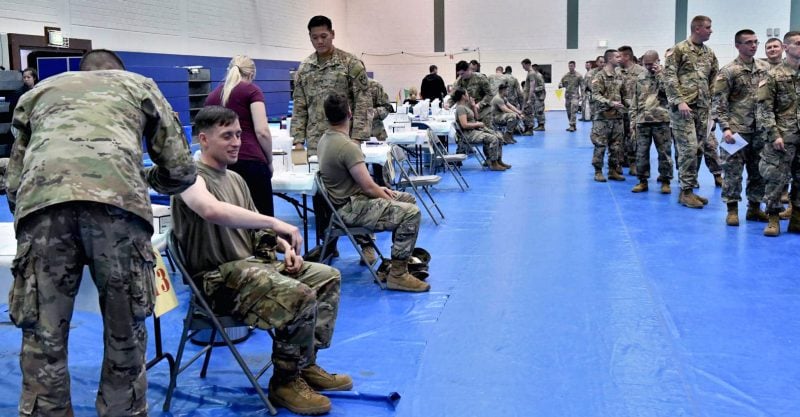Miss a day, miss a lot. Subscribe to The Defender's Top News of the Day. It's free.
As a civilian you have the right to refuse an influenza vaccine (although in some states employers can require healthcare workers to get the vaccine as a condition of employment). The Centers for Disease Control and Prevention (CDC) reports that 51.6% of adults in the U.S. refused the influenza vaccine in 2019 and 2020.
But if you are a member of the military, you are required to get an annual flu vaccine by Dec. 1, unless you can obtain a valid medical exemption.
What compelling reason justifies why military members cannot decide for themselves about the flu vaccine like all other Americans? Do military members have a higher risk of influenza infection or complications?
Has the flu vaccine demonstrated high rates of effectiveness for influenza prevention? What are the vaccine risks that counter the perceived benefits to the health of the military forces?
Should we consider that a flu vaccine contract for 2.5 million people annually makes the military a cash cow for the pharmaceutical industry?
It’s time for the military to reappraise its one-size-fits-all approach to flu vaccines and consider instead an individualized approach geared toward protecting the health and freedom of military personnel.
Are military members an ‘at risk’ group for influenza complications?
According to the CDC, populations who are at high risk for flu complications are adults 65 years and older and anyone with asthma, heart disease and stroke, diabetes and kidney disease.
The longer list of at-risk chronic medical conditions that are disqualifiers for military service include obesity, neurological conditions, blood disorders, lung disease, metabolic syndromes, HIV/AIDS and cancer. In other words, only healthy people can qualify for military service — and there’s no indication that healthy young men and women who are physically fit have an increased risk for complications from a flu infection.
The risk factors in the military population simply don’t justify a mandate for the influenza vaccine in members.
What is the minimum effectiveness rating for a mandated vaccine?
The military requires a healthy force year-round. This motivates leaders to implement prevention measures for outbreaks of infection during cold and influenza season.
It seems responsible to set a minimum level of effectiveness in any mandatory prophylactic treatment, and yet the flu vaccine has no such qualification. The average effectiveness rating for the flu vaccine between 2004 and 2019 was 40% effective, more accurately stated as 60% failure rate.
The most effective rating year for the flu vaccine occurred in 2010 and 2011 with 60% effectiveness. In 2004 and 2005, the flu vaccine was rated only 10% effective, and yet it was still mandated for military members with a 90% failure rate.
The CDC explains that a 10% effectiveness rating indicates a 10% reduction in disease occurrence among the vaccinated group. The influenza vaccine is manufactured up to a year in advance of knowing what prevalent circulating strain of influenza will affect the U.S., so it will likely never have an effectiveness rating greater than 60%.
The CDC graph below shows the unpredictable range of effectiveness ratings of the annual flu vaccine for the past 10 years:
There is no published minimum effectiveness rating for a vaccine to be approved by the Food and Drug Administration (FDA) or recommended by the CDC. However the FDA has set the minimum effectiveness rating for the pending COVID-19 vaccine approval at 50%. If this FDA 50% effectiveness standard applied to the annual flu vaccine, then it would not have been approved for use in 12 out of the past 16 years.
Does the flu vaccine increase other health risks?
The flu vaccine increases risk of contracting non-flu respiratory viruses, including rhinoviruses, enteroviruses and coronaviruses, by 65%. According to Physicians for Informed Consent:
“Although some studies suggest positive effects of the flu vaccine on the incidence of illness caused by flu viruses, that benefit is potentially outweighed by the negative effects of the flu vaccine on the incidence of non-flu respiratory illness. To address the concern among patients that the flu vaccine causes illness (i.e., acute respiratory illness), the Centers for Disease Control and Prevention (CDC) funded a three-year study, published in Vaccine, to analyze the risk of illness after flu vaccination compared to the risk of illness in unvaccinated individuals. The study found there is a 65% increased risk of suffering from a non-flu acute respiratory illness within 14 days of receiving the flu vaccine. The authors state, ‘Patients’ experiences of illness after vaccination may be validated by these results.’ This is important because although flu vaccines target three or four strains of flu virus, over 200 different viruses cause illnesses that produce the same symptoms — fever, headache, aches, pains, cough, and runny nose — as influenza, and more than 85% of acute respiratory illnesses do not involve the flu.”
The increased risk of contracting coronavirus from receiving the flu vaccine should be included with informed consent between doctors and patients, including military members. There is no justification to mandate a product that increases risk for coronavirus given the social sanctions currently in place.
The cost-benefit analysis of any treatment belongs to the uncoerced patient, and should be made after careful assessment of his or her own unique risk factors. Individuals, out of self-preservation and free of financial conflicts of interest, almost always make better health choices for themselves compared with choices made on their behalf by someone else.
In 2020, It’s time to reevaluate the military’s mandatory influenza vaccine program based on lack of effectiveness, increased risks of contracting other viruses and violating medical ethics of choice without compulsion.






